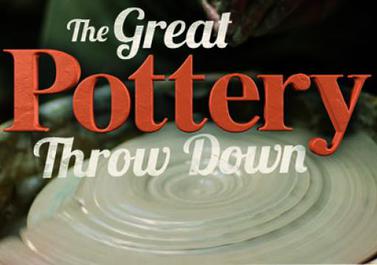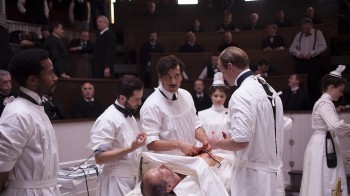The Christmas television schedules have, for many years, introduced a sense of the Carnavalesque to the viewing experience. Broadcasters, programmes, and family favourites collude in temporarily suspending the ‘normal’ laws and rules of television viewing through one-off storylines, and, in some cases, subverting perceptions of seriality in acknowledgement of a collective cultural ritual. Christmas television has become so central to the Christmas experience that recently, in the words of the Bishop of Leeds, it has now become the modern-day “Midnight mass”; the focal point for family worship and togetherness.
Central to this experience is the television Christmas special. Yet outside of Broadcaster websites, fan blogs and vlogs, very little critical attention has been given to this particular format and phenomenon – the one exception being Diane Werts’ 20-year study of (largely American) Christmas on Television (2006). This seems strange when over the last 10 years the BBC’s flagship Doctor Who has turned the concept of the Christmas special into a cultural meme or ‘Media Event’ in its own right, and the BBC’s Sherlock looks set to do the same.
If we are to view Christmas viewing as an especially unifying experience reinforcing collective identities, it is important to understand just what that experience describes, and how programmes such as Doctor Who and Sherlock function within this experience. As both Matt Hills (2014; 159), and Amy Holdsworth (2011; 113) point out with regard to Doctor Who in particular, although the programme has been positioned as “a matter of public value, providing the ‘social glue’ to unite a nation”, it has also been positioned to attract “a global array of fan-viewers…drawing on BBC nostalgia”. The Christmas special, it can be argued, only serves to heighten or emphasise this position and phenomenon and therefore occupies a dynamic position in terms of television programming.
We can view the Christmas special as negotiating tradition and change, convention and re-inscription. Its form is more often than not profoundly self-reflexive, especially when approached through its paratexts, and its status, in some circumstances (Sherlock Mini Episode 2013), as a one-off, allows its story-world to often speak more directly to its fan-base or to issues and current events that might normally be out of bounds. Another feature of the Christmas special is the migration of actors from outside of the story-world into the special feature. With the latest Sherlock Christmas special, the contemporary story-world has migrated back in time also. The Christmas special re-invents itself as part of the Christmas tradition.
With particular reference to Doctor Who and to Sherlock I will argue that these BBC Christmas specials provide us with an example of how “The changing function of television with respect to national self-representation” (Elsaesser 2013; 11) accommodates the veracities of global and transnational culture. The latest Sherlock Christmas special – The Abominable Bride, (I January 2016) – will become a “Global cinema event” also (Daily Express, October, 2015), that will include a “secret message” for its estimated “98 million fans in China” (Daily Telegraph, November 2015).Both Doctor Who and Sherlock therefore offer not only a local/national Christmas experience, but one that meets the transnational, global, and multi-directional nature of contemporary culture. Both programmes are presented as “the voice/medium of the local in the global sphere” (Longden 2015). In fact it is through the construction and representation – “a performative self-display” (Elsaesser2015, LJMU Research Seminar) – of the local/national that makes both of these programmes and their Christmas specials transnational and global. The Christmas special appeals to a variety of communities through a sense of public value, fandom, nostalgia, and a self-reflexive or ‘knowing’ idea of national identity/heritage that to all intents and purposes describe processes of self-exoticism.
As I have mentioned elsewhere (CST Blog, 03/12/15), if we take self-exoticism to be “forms of performative self-display, and therefore as a strategy for regaining agency under conditions of asymmetrical power-relations” (Elsaesser 2015, LJMU Research Seminar), then the Christmas specials offer more than just a sense of the festive spirit and carnavalesque. In fact, whilst the mythos of both fictions is symbolically re-inscribed for the traditional message of the festive season – unity, peace, and goodwill – the fictitious scenario of bringing order to conditions of confusion and chaos also resonates with an audience living in a ‘de-traditionalised’ world. Similarly, the regeneration theme of Doctor Who in particular, is coterminous with the idea of Christmas as a time of tradition and change, but it also a theme that fits with the way television has had to reconsider and re-inscribe ideas about national representation in the global era. For the BBC’s Sherlock, the Christmas specials only serve to heighten awareness of this performative self-display and the processes of re-inscription for transnational and global viewing communities. The 2013 Sherlock Christmas special – Many Happy Returns (aired 24 December) – is to all intents and purposes a direct address to fan forums and a self-reflexive nod to the coming return of the new series (The Empty Hearse, aired 1 January 2014). It is a self-exoticism that complicates “distinctions between ‘domestic’ and ‘foreign’ perceptions.” (Huggan 2013; 82), and the forthcoming Christmas special – The Abominable Bride – goes one step further by playing upon a milieu and iconography that is not only familiar in the popular imagination globally, but which draws upon strategies used in tourism to sell Britain as an exotic location.
As a strategy for regaining agency under conditions of asymmetrical power relations, through their use of self-exoticism, these Christmas specials confront what Elsaesser describes as “Globalization, shaped by neoliberalism” (2015) by describing a transnational and global culture marked by heterogeneity and local cultures rather than homogeneity. They present a ‘Double Occupancy’ (Elsaesser 2015), and in terms of transnational culture, display an “awareness of ‘cultural difference’ as a global commodity” (Huggan 2013; 83). The Christmas specials therefore exist within a complex network of commercial and cultural pressures, alluded to through their narratives or story-worlds, yet which act as problem-solving (Sherlock) exercises offering solutions and a feel-good experience. In other words, the nation, the national Christmas tradition, is under threat from global consumerism and loss of national identity, but the Doctor and Sherlock (and the Christmas special) have it under control.
Speaking of the Doctor Who 50th Anniversary, for Matt Hills (2014; 160), where asymmetrical power-relations are concerned, neoliberalism has had a major impact, not only influencing BBC policy, but shaping the Doctor Who experience through the “merging of public service broadcasting and commercial forces”. It would be naïve to ignore that the Christmas special serves a distinct economic, as well as cultural need. However, i want to suggest that the Christmas special – be it Doctor Who or Sherlock – whilst they may exist within these forces and economic conditions, on screen they tend to confront more visible and immediate threats – global terrorism and/or organised crime and for good reason.
We can therefore consider the ways in which the Christmas specials offer an opportunity to introduce or reinforce a public consensus. In these respects the Christmas special falls into a category provided by Diane Werts in her chapter ‘Christmas with a Conscience: Time For Social Statements’ (2006). These are post-9/11 Christmas specials and in these respects, self-exoticism in the Christmas specials not only negotiates the interface between national, transnational, and global, its performative self-display points to a loss of innocence – a kind of ‘knowingness’. Or in the case of Sherlock, a sense of after-the-(Reichenbach)fall. This theme is especially interesting with regard to a post-national sensibility and self-exoticism.
Starting with The Christmas Invasion (aired 25 December, 2005), Doctor Who has often relied on themes of terrorism, or threats to security, to point to a loss of innocence, to question tradition and its conventions (The Runaway Bride, 2006; The Doctor, the Widow, and the Wardrobe 2011), to highlight changing global practices (Voyage of the Damned, 2007; Last Christmas, 2014), or to throw into doubt questions of identity and the rituals we use to confirm identity (The Next Doctor, 2008; The End of Time, 2009, etc.). In the case of Sherlock, The Empty Hearse (2014), makes no bones that it is a Terrorist threat has necessitated the return of Sherlock Holmes. That terrorism has become the bogeyman of Christmas in these Christmas specials should come as no surprise, especially as heritage sites, tourism, sites of national interest, even mobilities themselves, have become targets for acts of terrorism or part of a “world risk society” (Aas 2007/Beck 2002). These too are part of the asymmetrical power-relations for which the performative self-display of the Christmas specials, and their self-exoticism, respond to.
As an overview of the Christmas special, the points raised here with regard to their cultural and critical contexts should be considered in more detail due to the phenomenon that surround them, and in their own right as media events. The forthcoming Sherlock Christmas special – The Abominable Bride – is especially interesting with regard to all the points I have mentioned, but also because it taps into BBC nostalgia – an area I have studiously avoided because of its complexity. The decision to revert back to its Victorian roots is telling, not just because the original canon debuted at Christmas (Beetons Christmas Annual 1887), but because it taps into a BBC Christmas tradition; that of the Christmas ghost story. But that is for another paper.
Kenneth Longden has lectured as part of the academic staff at Liverpool John Moores University in Media, Critical, and Creative Arts, and studied for a MPhil/PhD in Transnational Narratives at The University of Winchester. He is a Fellow HEA, and a Peer-Reviewer for various academic journals. He has been published by Intellect Books and Palgrave MacMillan, and writes on Popular Narrative, Film, Television, Fandom, and Popular Culture.





